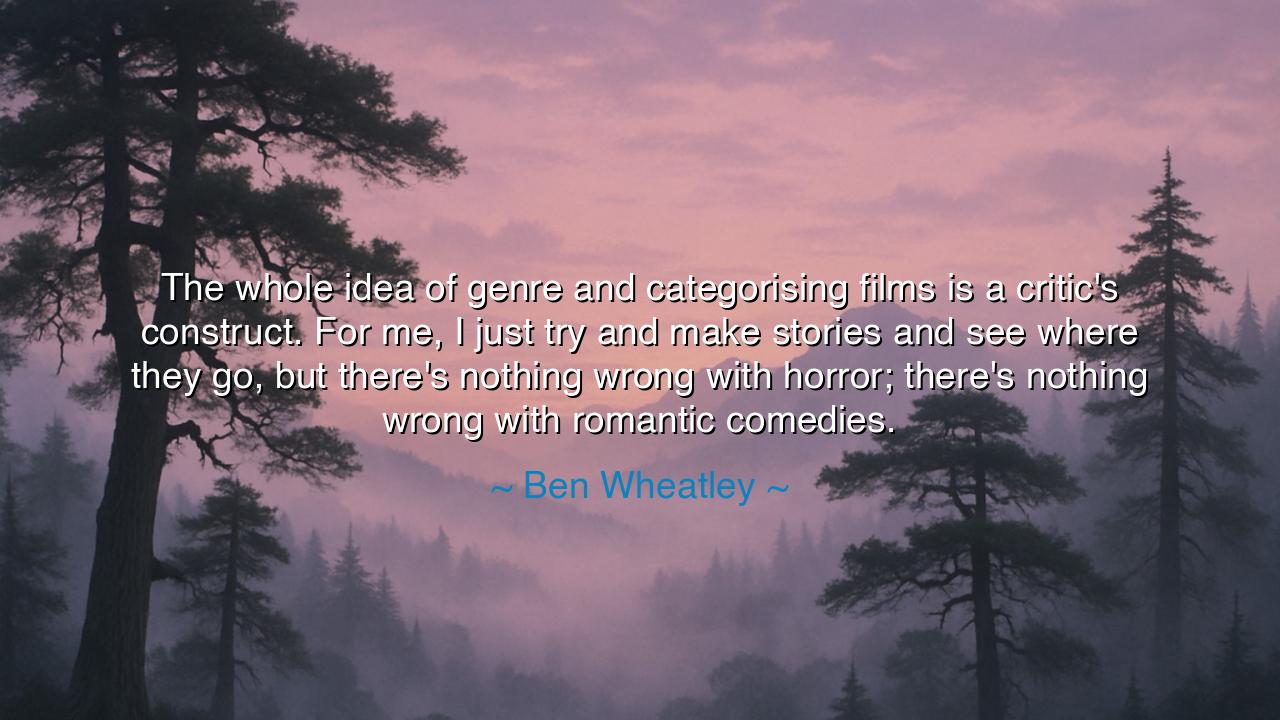
The whole idea of genre and categorising films is a critic's
The whole idea of genre and categorising films is a critic's construct. For me, I just try and make stories and see where they go, but there's nothing wrong with horror; there's nothing wrong with romantic comedies.






"The whole idea of genre and categorising films is a critic's construct. For me, I just try and make stories and see where they go, but there's nothing wrong with horror; there's nothing wrong with romantic comedies." These words by Ben Wheatley speak to a profound truth about the nature of artistic creation—the inherent desire to create stories without the constraints of predefined boundaries. To classify films into rigid genres—whether they are horror, romantic comedies, or any other category—limits the freedom of expression and distorts the way we experience them. Wheatley reminds us that the true purpose of storytelling is not to fit into a box, but to explore the depths of human experience, allowing the narrative to unfold naturally, without the need for classification.
In the ancient world, storytelling was not bound by genre or strict categories. The epic poems of Homer, like the Iliad and the Odyssey, defy any simple classification. They blend heroic deeds, romance, and divine intervention into rich, complex narratives that transcend genre. The ancient Greeks did not concern themselves with labeling their stories as one thing or another. They sought to create narratives that captured the fullness of the human experience. The hero’s journey, full of conflict, love, and tragedy, was the beating heart of their tales, not confined by the narrow definitions that critics often place on art today. These stories were fluid, evolving as they were passed down through generations, and their power came from their unpredictability and depth, not from their ability to fit into a neat category.
Consider also the great works of Shakespeare, whose plays defy the limitations of classification. His tragedies, such as Macbeth or Hamlet, are filled with romantic elements, while his comedies, like A Midsummer Night’s Dream, have moments of darkness and tragedy. Shakespeare understood that human experience could not be neatly categorized; it is a blend of joy and sorrow, love and fear, and the best stories are those that reflect the full spectrum of emotions. His works remain relevant today not because they conform to a single genre, but because they capture the complexity of life itself. Wheatley’s refusal to be bound by genre is a modern echo of this timeless truth—that storytelling is about exploring life, not about fitting neatly into a predefined space.
The idea of genres as a critic's construct is particularly poignant in an age where the marketplace often dictates the terms of artistic creation. Critics and industry insiders, in their pursuit of labeling and categorizing, often try to shape the stories we tell into something familiar, something that can be easily sold and consumed. Yet, in doing so, they risk stripping away the creativity and depth that are the essence of true art. Wheatley’s approach of making stories and seeing where they go is a powerful reminder that creativity thrives when it is not confined by rigid expectations. It is about following the narrative wherever it leads, trusting that the richness of human experience cannot be contained in any one box.
Consider the film The Shining by Stanley Kubrick. While it is often classified as a horror film, it transcends the genre. It is a film about family, madness, isolation, and psychological torment. The beauty of Kubrick’s vision lies in his ability to blend genres—it is a horror story, yes, but it is also a profound exploration of the human condition. This blending of genres—taking elements from different categories and combining them into a singular, complex narrative—reminds us that art is meant to challenge the boundaries we place on it. Kubrick, like Wheatley, was less concerned with fitting his film into a genre and more focused on telling a story that felt true to the complexities of human emotion.
The lesson here is clear: we must embrace freedom in our own lives, whether in our creativity, relationships, or pursuits. The need to label and categorize often limits our potential and our ability to experience life in its full, unfiltered form. Just as Wheatley refuses to let his films be confined by genre, we should not allow the world to confine us by the roles or categories others place upon us. Our stories—the stories of our lives—are far more complex and nuanced than any single label can capture.
In our daily lives, let us strive to break free from the constraints of conventional thinking, whether in our work, our relationships, or our creative endeavors. Like Wheatley, let us embrace the full range of human experience, without worrying about fitting neatly into categories. Let our stories unfold naturally, without concern for the labels placed upon them, knowing that it is in the unexpected and unpredictable moments that true growth and discovery occur. Just as Homer and Shakespeare crafted narratives that transcend the limits of genre, so too can we live lives that are rich, complex, and full of meaning.






AAdministratorAdministrator
Welcome, honored guests. Please leave a comment, we will respond soon